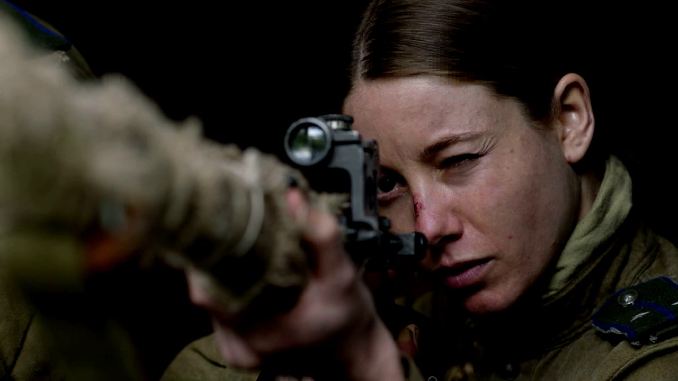WWII Thriller Hauls Hitler’s Corpse to a Dangerous Burial

We will never run out of stories to tell about the Holocaust and World War II because the Holocaust and World War II left such a crater that the stories worth telling about both are without end. In The Meaning of Hitler, documentarians Petra Epperlein and Michael Tucker examined the Führer’s present-day survival as a symbolic figurehead; their thesis is concerned with contemporary hate movements poisoning democratic nations, but can be applied to pop culture, too. Indiana Jones, Hellboy and Captain America fought Nazis. Kylo Ren is, for all intents and purposes, a Nazi paraphernalia collector. It’s a wide, varied, eclectic list.
Add to that list Ben Parker’s Burial, a Holocaust fiction like Quentin Tarantino’s Inglourious Basterds, except solemn in tone and absent the satisfactory sight of Hitler’s head being blasted to pieces. (And then the pieces to pieces.) Burial, like Epperlein and Tucker’s film, wonders what Hitler meant to his partisans even after his death, and presupposes that Stalin charged a cadre of Russian troops to carry the evil bastard’s carcass back to Moscow. Again: A fiction. But Parker has made an interesting fiction, admittedly in need of about 10 more minutes of running time for characters’ sake, plus a couple of tweaks to its framing device.
In the 1990s, Anna Marshall (Harriet Winter) foils a dimwit neo-Nazi prick’s break-in attempt on her home. She has something he wants. He has secret intel she’d rather stay hidden. But his intel is faulty—remember, he’s a dimwit neo-Nazi—so Anna drugs him, binds him and schools him on the time about a half century ago when she, going by her her true name, Brana Vasilyeva (Charlotte Vega), led a team across treacherous territory to bring the ultimate prize, a rotting Hitler, to Stalin. As man-on-a-mission films tend to, the enterprise hits a few bumps along the way: A Werwolf unit, watched over by Führer zealot Wölfram Graeber (Kristjan Üksküla), who knows what Brana and her men are lugging around with them, even though none of them do besides Brana.
Parker’s setup benefits from clear stakes and simplicity. The setting is a peril on its own, because of all the routes to choose while dragging Hitler’s festering corpse, vacant wooded backroads from Berlin to Poland are probably the worst. Cinematographer Rein Kotov keeps Burial’s cast under constant watch, stirring the unnerving sensation that Germany’s trees are surveilling them. Robert Eggers would be impressed. Neither the trees nor the hills have eyes, of course, but the ragtag unit of Nazi fanatics lurking among them do. When Ilyasov (Dan Renton Skinner), one of Brana’s subordinates, decides he’s owed a night of carousing and attempted rape—the Polish barmaid running the nearby tavern solo meets Ilyasov’s standard for the spoils of war—the Werwolf soldiers strike, and Burial gets bloody ghoulish.
The film makes the clever decision to invoke Werwolf’s intended purpose rather than studiously lean toward history; after all, Goebbels’ propaganda machine was part of history, too. In practice, Werwolf was just a series of comical logistical fuck-ups. In the hearts and minds of American soldiers (and, let’s be honest, the media), they were the epitome of Germans’ resolve to resist defeat, down to the last civilian. Burial has good, macabre fun with the myth by decking out the Nazis in wolf-head hats and arming them with hallucinogenic “bombs” made of lichen and mushrooms. Spooky! The effect works nicely, dovetailing the popular Third Reich tactic of “lying” with the popular concept of its high leadership’s obsession with occult and supernatural balderdash.
-

-

-

-

- Curated Home Page Articles By Test Admin October 21, 2025 | 3:10pm
-

- Curated Home Page Articles By Test Admin October 21, 2025 | 2:57pm
- Urls By Test Admin October 21, 2025 | 2:57pm
- Curated Home Page Articles By Test Admin October 21, 2025 | 2:55pm
-

-

-

-

-

-

-

-

-

-

-

-

-

-

-

-

-

-

-

-

-

-

-

-

-

-

-

-

-

-

-




































